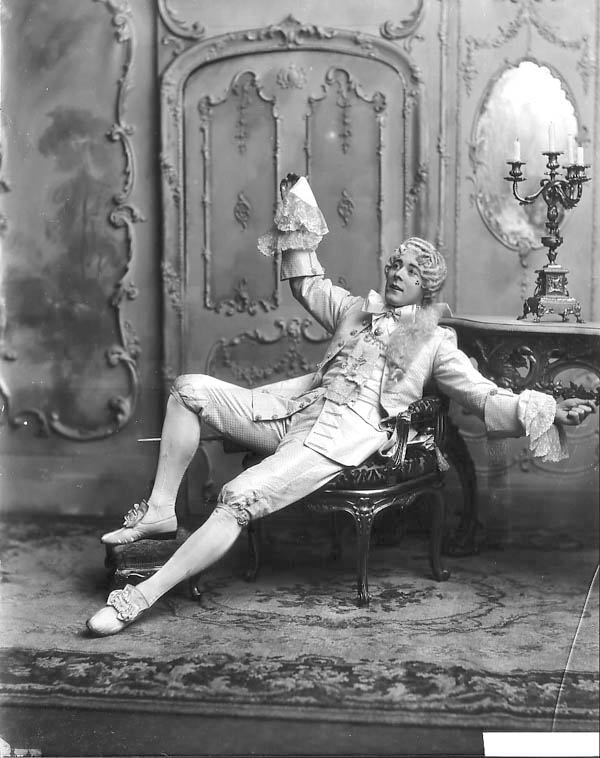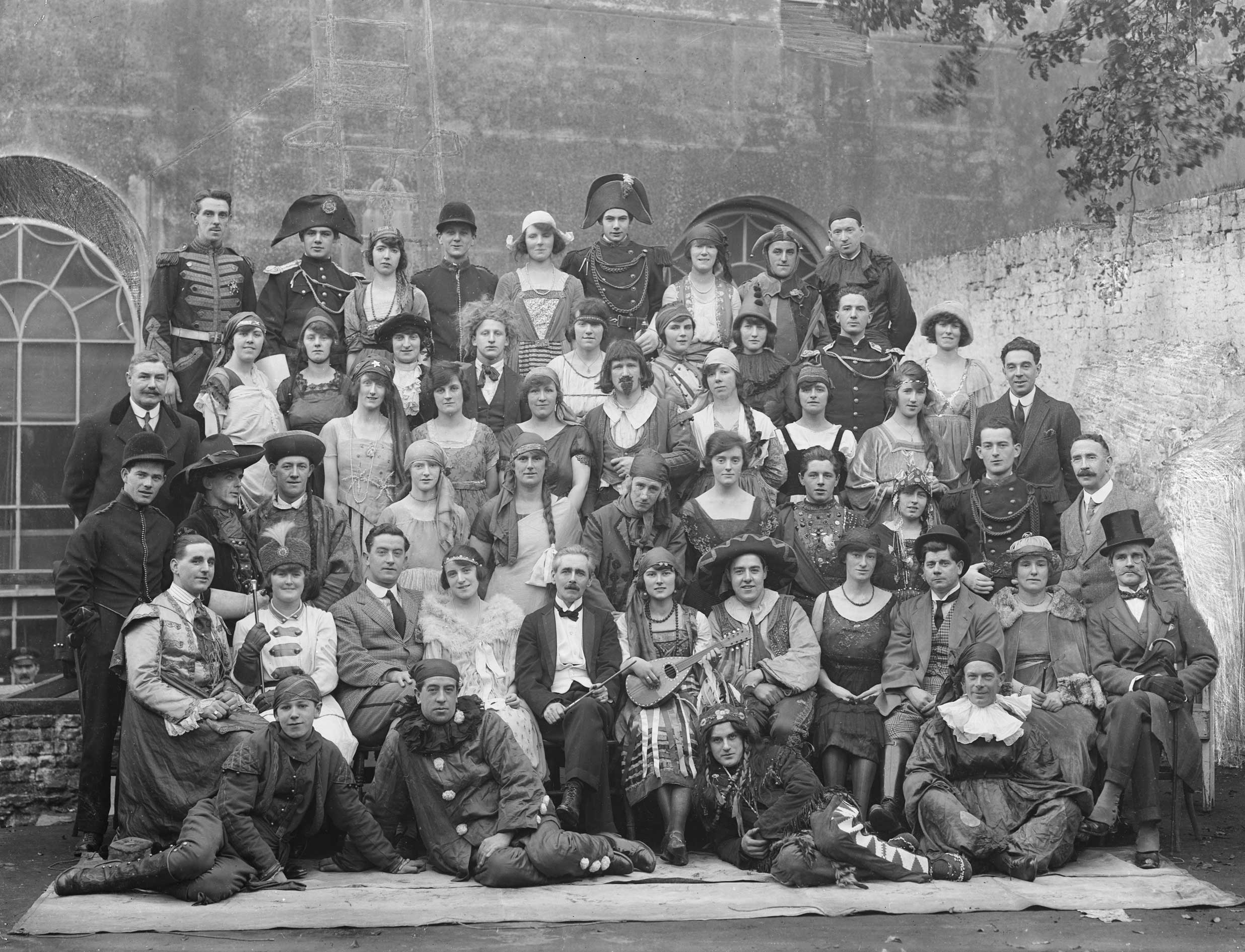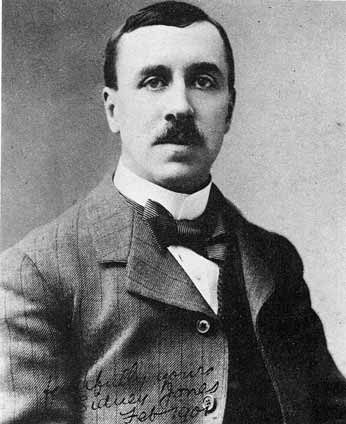|
Daly's Theatre (30th St.)
Daly's Theatre was a Broadway theatre at 1221 Broadway and 30th Street. It was built in 1867 and opened that year as Banvard's Museum but changed its name the following year to Wood's Museum and Metropolitan. In 1876 it became the Broadway Theatre, and finally was named Daly's Theatre in 1879 when it was acquired by Augustin Daly. After 1899, it was operated by the Shubert family. The building was demolished in 1920, after serving as a burlesque theatre and cinema. History The theatre was built by John Banvard, who opened it in 1867 as a museum-theatre. Banvard sold the building the following year, and it was renamed for the new owner, Wood, who mounted musical Victorian burlesque and other productions of light musical comedy. Banvard regained control of the theatre in 1876 and renamed it the Broadway Theatre. Augustin Daly acquired the building in 1879 and renamed it for himself. There, he operated one of the last stock companies in New York City, presenting Edwardian musical c ... [...More Info...] [...Related Items...] OR: [Wikipedia] [Google] [Baidu] |
Augustin Daly
John Augustin Daly (July 20, 1838June 7, 1899) was one of the most influential men in American theatre during his lifetime. Drama critic, theatre manager, playwright, and adapter, he became the first recognized stage director in America. He exercised a fierce and tyrannical control over all aspects of his productions. His rules of conduct for actors and actresses imposed heavy fines for late appearances and forgotten lines and earned him the title "the autocrat of the stage." He formed a permanent company in New York and opened Daly's Theatre in New York in 1879 and a second one in London in 1893. Biography Augustin Daly was born in Plymouth, North Carolina to Captain Denis Daly, a sea-captain and ship owner, and Elizabeth, daughter of Lieutenant John Duffy of the British Army. He was educated at Norfolk, Virginia, and in the public schools of New York City. His mother, early left a widow, brought her two boys to New York City, where they soon became frequent attendants at the th ... [...More Info...] [...Related Items...] OR: [Wikipedia] [Google] [Baidu] |
Der Seekadet
Der or DER may refer to: Places * Darkənd, Azerbaijan * Dearborn (Amtrak station) (station code), in Michigan, US * Der (Sumer), an ancient city located in modern-day Iraq * d'Entrecasteaux Ridge, an oceanic ridge in the south-west Pacific Ocean Science and technology * Derivative chromosome, a structurally rearranged chromosome * Distinguished Encoding Rules, a method for encoding a data object, including public key infrastructure certificates and keys * Distributed Energy Resources * ∂, the partial derivative symbol *Deep energy retrofit, an energy conservation measure Organizations * Digital Education Revolution, former Australian Government-funded educational reform program * DER rental (Domestic Electric Rentals Ltd), a UK television rentals company * Documentary Educational Resources, a non-profit film producer and distributor Other uses *Defence (Emergency) Regulations, legal regulations promulgated by the British in Mandatory Palestine in 1945 *Department of Environ ... [...More Info...] [...Related Items...] OR: [Wikipedia] [Google] [Baidu] |
Seymour Hicks
Sir Edward Seymour Hicks (30 January 1871 – 6 April 1949), better known as Seymour Hicks, was a British actor, music hall performer, playwright, actor-manager and producer. He became known, early in his career, for writing, starring in and producing Edwardian musical comedy, often together with his famous wife, Ellaline Terriss. His most famous acting role was that of Ebenezer Scrooge in Charles Dickens's '' A Christmas Carol''. Making his stage début at the age of nine and performing professionally by sixteen, Hicks joined a theatrical company and toured America before starring in ''Under the Clock'' in 1893, the first musical revue ever staged in London. Following this, he starred in a revival of ''Little Jack Sheppard'' at the Gaiety Theatre, London which brought him to the attention of impresario George Edwardes. Edwardes cast Hicks in his next show, ''The Shop Girl'', in 1894. Its success led to his participation in two more of Edwardes's hit "girl" musicals, ''The Cir ... [...More Info...] [...Related Items...] OR: [Wikipedia] [Google] [Baidu] |
Harry Nicholls (comedian)
Henry Thomas "Harry" Nicholls (1 March 1852 – 29 November 1926) Gilbert and Sullivan Archive, 7 October 2004, accessed 26 September 2018. was an English actor, comedian, songwriter and playwright, popular during the . As an actor, he appeared in music hall, Victorian burlesques and . He was perhaps best known for starring in the |
Lionel Monckton
Lionel John Alexander Monckton (18 December 1861 – 15 February 1924) was an English composer of musical theatre. He became Britain's most popular composer of Edwardian musical comedy in the early years of the 20th century. Life and career Early life Monckton was born in London, the eldest son of the Town Clerk of London, Sir John Monckton (town clerk), John Braddick Monckton, and Lady Monckton, the former Maria Louisa Long (1837–1920), an "enthusiastic amateur actress".Gänzl, Kurt."Monckton, (John) Lionel Alexander (1861–1924)", Oxford Dictionary of National Biography, Oxford University Press (2004) accessed 16 April 2008 His sister was Mrs Augusta Moore, who wrote popular novels as Martin J. Pritchard. He was educated at Charterhouse School and Oriel College at Oxford University, graduating in 1885. There he acted in college theatrical productions and composed music for productions of the Oxford University Dramatic Society, of which he was a founder, and the Phil-T ... [...More Info...] [...Related Items...] OR: [Wikipedia] [Google] [Baidu] |
Ivan Caryll
Félix Marie Henri Tilkin (12 May 1861 – 29 November 1921), better known by his pen name Ivan Caryll, was a Belgian-born composer of operettas and Edwardian musical comedies in the English language, who made his career in London and later New York. He composed (or contributed to) some forty musical comedies and operettas. Caryll's career encompassed three eras of the musical theatre, and unlike some of his contemporaries, he adapted readily to each new development. After composing a few musical burlesques, his first great successes were made in light musical comedies, epitomised by the George Edwardes productions at London's Gaiety Theatre, such as ''The Shop Girl'', ''The Circus Girl'', ''The Gay Parisienne'', and ''A Runaway Girl''. He continued to write musical comedies throughout the next decade, including such hits as ''The Messenger Boy'', ''The Toreador'', ''The Girl From Kays'', ''The Earl and the Girl'', ''The Orchid'', ''The Spring Chicken'', ''The Girls of Got ... [...More Info...] [...Related Items...] OR: [Wikipedia] [Google] [Baidu] |
A Runaway Girl
''A Runaway Girl'' is a musical comedy in two acts written in 1898 by Seymour Hicks and Harry Nicholls. The composer was Ivan Caryll, with additional music by Lionel Monckton and lyrics by Aubrey Hopwood and Harry Greenbank. It was produced by George Edwardes at the Gaiety Theatre, London, opening on 21 May 1898 and ran for a very successful 593 performances. It starred Hicks's wife, Ellaline Terriss and Edmund Payne. The work had stiff competition in London in 1898, as other successful openings included ''A Greek Slave'' and '' The Belle of New York''. The piece ran at Daly's Theatre in New York City in 1898 and again in 1900. Internet Broadway Database, accessed November 29, 2018 The story concerns an Englishwoman who joins a group of musicians in Italy who are really bandits. Roles *Brother Tamarind ...[...More Info...] [...Related Items...] OR: [Wikipedia] [Google] [Baidu] |
Harry Greenbank
Harry Greenbank (11 September 1865 – 26 February 1899) was an English author and dramatist best known for contributing lyrics to the successful series of musicals produced at Daly's Theatre by George Edwardes in the 1890s. Life and career Harry Greenbank was born Henry Harveston Greenbank in London, England and had an extraordinarily productive, but short, life. Greenbank first placed one of his works, '' Captain Billy'', at the Savoy Theatre, set to music by the company's musical director François Cellier. The piece was staged as a curtain-raiser to ''The Nautch Girl'' beginning in 1891. He continued to write such small-scale pieces over the following couple of years, both for the Savoy ('' Mr. Jericho'' in 1893 and '' Old Sarah'' in 1897) and for the Lyric Theatre, where Horace Sedger asked him to supply the English lyrics to F. C. Burnand's adaptation of the French operetta '' Le coeur et la main'' (''Incognita''). After that, George Edwardes put Greenbank together as ... [...More Info...] [...Related Items...] OR: [Wikipedia] [Google] [Baidu] |
Owen Hall
Owen Hall (10 April 1853 – 9 April 1907) was the principal pen name of the Irish-born theatre writer, racing correspondent, theatre critic and solicitor, James "Jimmy" Davis, when writing for the stage. After his successive careers in law and journalism, Hall wrote the librettos for a series of extraordinarily successful musical comedies in the 1890s and the first decade of the 1900s, including ''A Gaiety Girl, An Artist's Model, The Geisha, A Greek Slave'' and ''Florodora''. Despite his achievements, Hall was constantly in financial distress because of his gambling and extravagant lifestyle; his pseudonym was a pun on "owing all". Life and career Born in a Jewish household, Hall was the eldest son of an English dentist who practised in Dublin and later became a portrait photographer in London, Hyman Davis (1824–1875), and his wife Isabella (1824–1900), whose maiden name was also Davis. Endelman, Todd M. "The Frankaus of London: A Study in Radical Assimilation, 1837� ... [...More Info...] [...Related Items...] OR: [Wikipedia] [Google] [Baidu] |
Sidney Jones (composer)
James Sidney Jones (17 June 1861 – 29 January 1946), usually credited as Sidney Jones, was an English conductor and composer, who was most famous for composing the musical scores for a series of musical comedy hits in the late Victorian and Edwardian periods. Jones's most famous musical was ''The Geisha'', but several of his pieces were among the most popular shows of the era, enjoying long runs, international tours and revivals. In 1892, after nine years of conducting touring companies of British operettas for Alfred Cellier and George Edwardes, Edwardes engaged Jones to conduct several operettas and musical comedies in London. Jones had begun composing incidental music and supplemental songs for some of the shows he conducted and even wrote scores of his own in 1889 and 1892. In 1893, one of his songs, "Linger Longer, Loo", composed for the 1892 burlesque ''Don Juan'' at the Gaiety Theatre, became popular throughout the English-speaking world. Jones's first hit show was ' ... [...More Info...] [...Related Items...] OR: [Wikipedia] [Google] [Baidu] |
Edwardian Musical Comedy
Edwardian musical comedy was a form of British musical theatre that extended beyond the reign of King Edward VII in both directions, beginning in the early 1890s, when the Gilbert and Sullivan operas' dominance had ended, until the rise of the American musicals by Jerome Kern, Rodgers and Hart, George Gershwin and Cole Porter following the First World War. Between '' In Town'' in 1892 and ''The Maid of the Mountains'', premiering in 1917, this new style of musical theatre became dominant on the musical stage in Britain and the rest of the English-speaking world. The popularity of ''In Town'' and ''A Gaiety Girl'' (1893), led to an astonishing number of hits over the next three decades, the most successful of which included '' The Shop Girl'' (1894), '' The Geisha'' (1896), ''Florodora'' (1899), '' A Chinese Honeymoon'' (1901), '' The Earl and the Girl'' (1903), '' The Arcadians'' (1909), ''Our Miss Gibbs'' (1909), ''The Quaker Girl'' (1910), ''Betty'' (1914), ''Chu Chin Chow'' ( ... [...More Info...] [...Related Items...] OR: [Wikipedia] [Google] [Baidu] |
The Geisha
''The Geisha, a story of a tea house'' is an Edwardian musical comedy in two acts. The score was composed by Sidney Jones to a libretto by Owen Hall, with lyrics by Harry Greenbank. Additional songs were written by Lionel Monckton and James Philp. ''The Geisha'' opened in 1896 at Daly's Theatre in London's West End, produced by George Edwardes. The original production had the second longest run of any musical up to that time. The cast starred Marie Tempest and C. Hayden Coffin, with dancer Letty Lind and comic Huntley Wright. The show was an immediate success abroad, with an 1896 production in New York and numerous tours and productions in Europe and beyond. It continued to be popular until World War II and even beyond to some degree. The most famous song from the show is "The Amorous Goldfish".Gänzl (1986), p. 589 Background and productions The success of ''An Artist's Model'' in 1895 had set the pattern for the Hall, Greenbank and Jones Edwardian musical comedies. Edwardes ... [...More Info...] [...Related Items...] OR: [Wikipedia] [Google] [Baidu] |
.jpg)

_2.jpeg)






